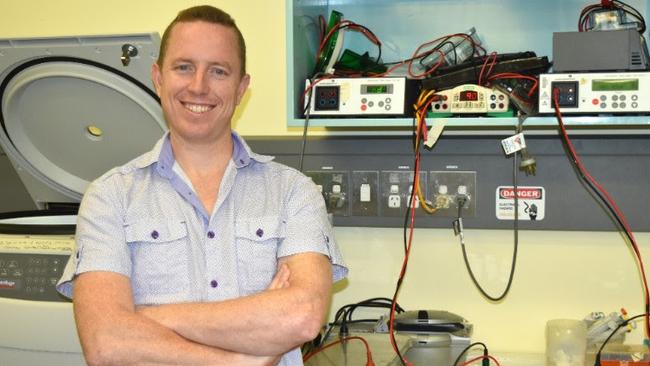Breakthrough in starving cancer cells of the food they are addicted to
CANCER cells can now be killed by starving them of the fuel they’re “addicted” to after a world-first breakthrough by Australian scientists.

News
Don't miss out on the headlines from News. Followed categories will be added to My News.
CANCER cells can now be killed by starving them of the fuel they’re “addicted” to after a world-first breakthrough by a group of Sydney scientists.
Researchers led by Centenary Institute Associate Professor Jeff Holst have discovered what they hope is a way to fight and kill aggressive malignant cells that cause some of the deadliest types of cancer, including breast, prostate and melanoma.

Prof Holst said the study found these cells thrive on an amino acid called glutamine, but normal cells do not.
The team has now developed a way of starving the cancer cells — but not healthy cells — essentially cutting the disease cell’s energy supply.
“We have known for 100 years that cancer cells take up nutrients and use them differently to normal cells but we haven’t been able to target that,” Prof Holst said.
“Cancer cells have found ways to use glutamine to fuel their growth and they become addicted to it, they are so dependent on it, that if you take it away from the cells they die.”

Prof Holst is now developing a groundbreaking drug which stops the cells taking in glutamine. The drug is expected to enter clinical trials in as little as three years.
“Our drug blocks a pump on the surface of the cell that brings in the nutrient, so that we can starve the cancer … it’s like putting tape over its mouth,” Prof Holst said. “At the moment we have no drugs that work this way so it’s a new concept.”
The team have discovered cancers resistant to conventional treatment, like triple-negative breast cancer, some prostate cancer and advanced melanoma, thrive on glutamine.
“We’ve shown when the cancer comes back it comes back reliant on glutamine so we think those patients will do really well when their cancer comes back with our drugs … because they can’t make new cancer cells without glutamine,” Prof Holst said.
“Potentially you could use it in combination (with other therapies) to stop the ability of the cancer cells coming back ... but we’ve got to develop the drugs first and make sure they’re safe.” Prof Holst said scientists from New York have contacted them about the breakthrough hoping to collaborate.
“In general, therapies have tried to be like the nuclear bomb where you hit it hard with chemotherapy or radiation and those things have a lot of side effects …. We are all looking for a real targeted therapy that is specific to cancer cells,” he said.
The clinical trials will proceed after the team secured funding from biotechnology company MetabloQ.


